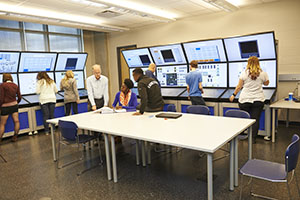UNENE MEng in Nuclear Engineering
| Degree |
Master of Engineering |
|---|---|
| Faculty | Faculty of Engineering and Applied Science |
| Location | Off-site |
| Start dates | September, January or May |
| Length | Students have a maximum of five years to complete the required number of courses |
| Program load |
Part-time |
| Program format | Course-based or courses with major project (industrial research project), domestic students only |

General information
The University Network of Excellence in Nuclear Engineering (UNENE) is a Canadian-based alliance of universities, nuclear power utilities, research and regulatory agencies for the support and development of nuclear education, research and development capability in Canadian universities. UNENE was created through the partnership of five Ontario universities including McMaster University, Queen’s University, Ontario Tech University, University of Waterloo and Western University.
The UNENE Master of Engineering (MEng) program is designed for the working professional, providing engineers the enhanced knowledge, tools, technology as well as business and management skills necessary to keep them at the forefront of their profession. The program is course-based, consisting of 10 courses, or eight courses and an industrial project. The project is normally co-sponsored by the student's employer and one of the universities.
Courses in the UNENE MEng are offered on alternate weekends, usually over a seven-week period. The program consists of about 40 hours contact time plus 100 hours of homework. Students are formally evaluated through assignments, tests and exams. Courses can also be delivered using distance education tools to accommodate those students working at sites remote from the Greater Toronto Area.
For more information on UNENE and/or for course listings, please visit the UNENE website.
Admission requirements
UNENE requires an honours or four‐year degree in engineering, science or mathematics, and a B average (GPA: 3.0 on a 4.3 scale or 73 to 76 per cent) or better. UNENE also considers any relevant work or research history. Meeting the minimum requirements does not guarantee acceptance.
Required supporting documents:
Please see the checklist of required documents for a list of supporting documentation that must be submitted with your application.
Required test scores for English language proficiency:
See English language proficiency for the minimum required test scores for this program.
Application deadlines
Please see application deadlines for specific dates. Note that the application deadlines listed are for both the online application and all supporting documentation.
How to apply
Applications for admission to all graduate studies programs are submitted online. There are five steps you must go through to complete the application process. See application process and requirements for step-by-step instructions.
Many of our graduate programs are extremely competitive; the number of qualified applicants normally exceeds the number of seats available for each intake. Satisfaction of minimum entry requirements does not ensure admission.
Program curriculum
For program requirements, including required number of credits for completion, program maps and course descriptions, please see the Graduate Academic Calendar and Course Catalogue.
Funding
Applicants to professional or course-based programs are not normally considered for internal funding sources such as entrance scholarships, minimum funding packages, teaching assistantships, research assistantships or graduate research assistantships.
While external scholarships and awards for graduate students who fall under the above criteria are often limited, we encourage you to explore some of the external scholarship databases available for possible funding opportunities.
Fees
Tuition fees for graduate programs are charged on a flat-fee or fee-per-credit basis and vary by program and student status.
For current, specific fees and details on flat-fee versus fee-per-credit programs, please see tuition and fees.
Contact
For more information:
Contact the program:
Faculty of Energy Systems and Nuclear Science
905.721.8668 ext. 5503
nuclear@ontariotechu.ca
Contact the School of Graduate and Postdoctoral Studies:
905.721.8668 ext. 6209
gradstudies@ontariotechu.ca